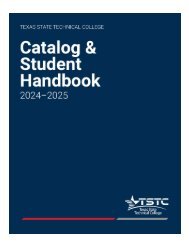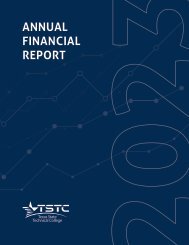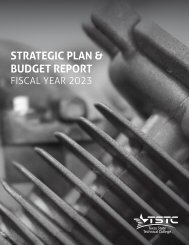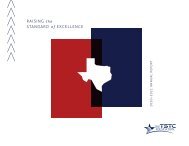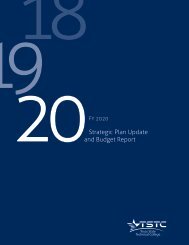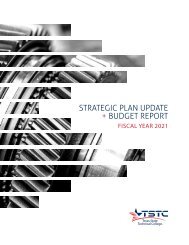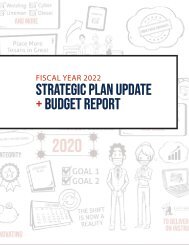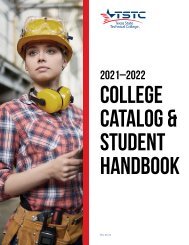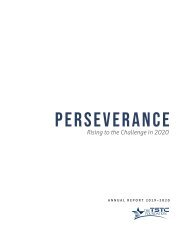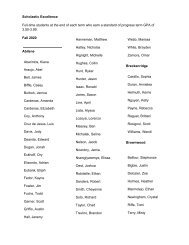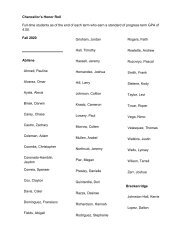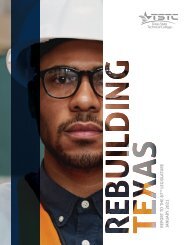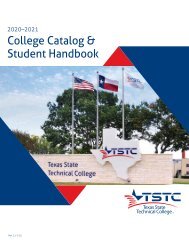Student Handbook and Catalog 2021-22 V2
Create successful ePaper yourself
Turn your PDF publications into a flip-book with our unique Google optimized e-Paper software.
66 | College <strong>Catalog</strong> <strong>and</strong> <strong>Student</strong> <strong>H<strong>and</strong>book</strong><br />
special meetings, <strong>and</strong> programs open to the public in<br />
accordance with College procedures.<br />
Statement of TSTC Academic<br />
<strong>Student</strong> Responsibilities<br />
1. Academic Freedom - <strong>Student</strong>s <strong>and</strong> all other members<br />
of the College’s community are guaranteed the<br />
rights freely to study, discuss, investigate, teach,<br />
conduct research, <strong>and</strong> publish as appropriate to their<br />
respective roles <strong>and</strong> responsibilities. In the classroom<br />
<strong>and</strong> in conference, students have the right within<br />
the scope of the course of study to state divergent<br />
opinions, challenge ideas, <strong>and</strong> take reasoned<br />
exception to the data or the views offered.<br />
Responsibility - <strong>Student</strong>s <strong>and</strong> faculty share the<br />
responsibility to protect <strong>and</strong> to preserve conditions<br />
that are conducive to the learning process, including<br />
withholding judgment on matters of opinion, ensuring<br />
a fair hearing for divergent viewpoints, <strong>and</strong> observing<br />
rules of courtesy in the classroom.<br />
2. Academic St<strong>and</strong>ards - <strong>Student</strong>s have the right to know<br />
the st<strong>and</strong>ards of academic performance established<br />
for each course in which they are enrolled.<br />
Responsibility - <strong>Student</strong>s are responsible for seeking<br />
clarification of any st<strong>and</strong>ard in question at the<br />
beginning of the term, for preparing assignments in<br />
advance of each class session, <strong>and</strong> for learning the<br />
content of any course of study for which they are<br />
enrolled. Rules applying to academic dishonesty must<br />
be followed, including those related to plagiarism <strong>and</strong><br />
cheating.<br />
3. Academic Evaluation - <strong>Student</strong>s have the right to be<br />
evaluated solely on an academic basis, without regard<br />
to issues of diversity, opinions, or conduct in matters<br />
unrelated to academic st<strong>and</strong>ards. <strong>Student</strong>s have the<br />
right to review tests <strong>and</strong> other written works after<br />
the instructor has evaluated them <strong>and</strong> are accorded<br />
protection through the <strong>Student</strong> Grievance Procedure<br />
against prejudiced or capricious academic evaluation.<br />
Responsibility - <strong>Student</strong>s are responsible for bringing<br />
academic grievances to the attention of the instructor<br />
who performed the evaluation in an effort to resolve<br />
the issue. If the matter cannot be settled at this level,<br />
the grievance may be appealed in writing as outlined<br />
in the <strong>Student</strong> Grievance Procedure.<br />
4. Confidentiality - Except when disclosure may be<br />
required by state or federal law, students have the<br />
right to confidentiality of information about views,<br />
beliefs, <strong>and</strong> political associations shared privately<br />
with instructors, advisers, or academic counselors.<br />
Judgment of a student’s ability <strong>and</strong> character may be<br />
provided under appropriate circumstances, normally<br />
with the knowledge <strong>and</strong> consent of the student.<br />
Responsibility - <strong>Student</strong>s have the responsibility to<br />
state clearly what type of personal information should<br />
not be disclosed to others.<br />
5. Academic Environment - <strong>Student</strong>s have the right<br />
to pursue an education without disruption or<br />
interference <strong>and</strong> to expect enforcement of norms<br />
for acceptable classroom behavior that prevents<br />
disruption of the teaching/learning process.<br />
Responsibility - <strong>Student</strong>s may not disrupt class or any<br />
other collegiate process by any means whatsoever<br />
(including sideline conversations, comments,<br />
arguments, intentional noisiness, or other activity<br />
which would hinder access to or utilization of<br />
academic information).<br />
6. Non-Discrimination - <strong>Student</strong>s have the right to learn<br />
in an environment where diversity is respected.<br />
Responsibility - <strong>Student</strong>s are responsible for<br />
respecting diversity <strong>and</strong> for behaving courteously<br />
to faculty members <strong>and</strong> to other students in the<br />
classroom regardless of difference in sex, color,<br />
religion, gender, national origin, genetic information,<br />
disability, or veteran status.<br />
7. Intellectual Property - <strong>Student</strong>s have the right to<br />
expect that presentation of material in a class will be<br />
in compliance with copyright law <strong>and</strong> that their own<br />
creative work will not be disseminated or published<br />
without their permission.<br />
Responsibility - <strong>Student</strong>s who receive written<br />
notification from a faculty member that the<br />
information provided in his or her course is the faculty<br />
member's intellectual property shall not distribute,<br />
use for commercial purpose, or create derivative<br />
works of the intellectual property without obtaining<br />
the express permission of the faculty member.<br />
<strong>Student</strong>s shall not assume permission absent written<br />
notification from a faculty member. <strong>Student</strong>s shall also<br />
respect <strong>and</strong> treat in similar manner the intellectual<br />
property of other students.<br />
Campus Assessment, Response <strong>and</strong> Education<br />
(CARE) Team<br />
The TSTC CARE (Campus Assessment, Response <strong>and</strong><br />
Education) Team strives to promote campus safety <strong>and</strong><br />
student success throughout the TSTC community. The<br />
CARE Team meets on a weekly basis to ensure that<br />
students are connected to the resources they need<br />
<strong>and</strong> that appropriate steps are taken to keep all TSTC<br />
campuses safe. Any concerns about a student should be<br />
reported to the CARE Team, whether it be a mental health<br />
concern, safety concern, behavioral concern, academic<br />
concern, or any concern that may involve a student’s wellbeing.<br />
tstc.edu<br />
Texas State Technical College



